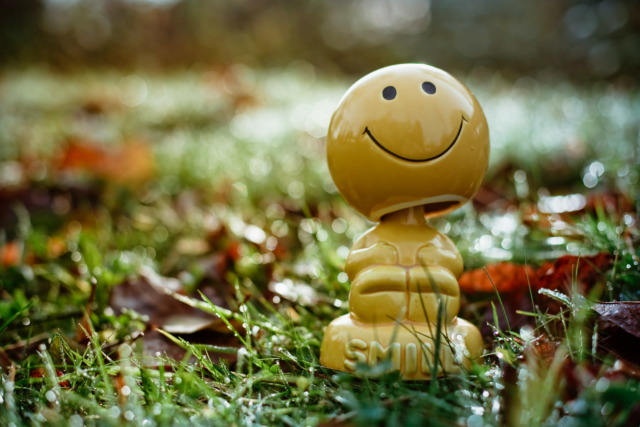We’ve been getting it wrong about happiness for a long time.
Going as far back as ancient Greece, Epicurus (born 341 BC) pointed out that most of us typically make three big mistakes when we think about what will bring us happiness: romantic relationships, lots of money, and luxuries.
So what really makes us happy?
To try and understand it, I interviewed two leading authorities in the “happiness” psychology field: Dr. Sonja Lyubomirsky and Professor Anthony Ahrens. Lyubomirsky is a professor of psychology at the University of California Riverside and the author of “The Myths of Happiness.” She’s been studying positive psychology since 1989. Ahrens teaches at American University and focuses on the study of gratitude, mindfulness, and fear of emotion.
Through all of our day-to-day hustling we can sometimes neglect our inner self, which is what research points to as one of the things that can actually make us happy. Lyubomirsky said most people desire happiness, and that many set it as their life goal. Yet what we think makes us happy — more money, a great marriage, higher social status — aren’t backed up by the research. Lyubomirsky suggests six tips you can try to increase your happiness:
- Recall moments of gratitude
- Reflect on yourself and engage in positive thinking
- Practice kindness
- Pursue life goals professionally and personally
- Affirm ones values
- Take time to recharge and savor positive experiences
Being happy could be seen as the “Holy Grail”, the ultimate life goal. But what is happiness? How would you define it? A state of mind? An emotion?
Lyubomirsky: There are two components to happiness. The first component is the experience of positive emotions. It is partly an emotion, which generates joy, curiosity, pride, and serenity. The second component is cognitive or judgment, that your life is going well; that your life is progressing to your goals.
Ahrens: I very much like a distinction that Martin Seligman makes about happiness. Happiness can be thought of as pleasure, or as meaning, and or as engagement. The happiness that I feel when I taste orange chocolate, chocolate chip ice cream is different from the happiness of being deeply engaged with a student who is struggling to master an idea, and this is different from the happiness of being completely absorbed in a game of volleyball.
We’ve all been annoyed with an extremely happy person, whether it’s a family member or colleague or classmate. While happiness may be the ultimate goal for many, when we actually encounter someone who is sincerely happy, we sometimes can’t reciprocate the genuine feelings back. When we are in a good mood their cheerfulness could be a ray of sunshine but when we’re frustrated with the small things in life, their optimism and over-the-top energy could be what triggers the final breakdown. In Dr. Lyubomirsky’s book The How of Happiness, she wrote that it is sometimes maladaptive to be too happy. So why is it not good to be too happy?
Lyubomirsky: Some research showing that if you are too happy, like a 10 out of 10, in some extreme cases can actually be a disadvantage to one’s social life. You can be disliked if you are too happy all the time, it can have a negative effects on their friends or acquaintances. It can have a harmful impact on your work, when you are too happy you may not be as focused on your work. Similar to when you first fall in love you, you tend to become less aware of your surroundings and just focused on the goods.

Sonja Lyubomirsky on the how of happiness
University of California Riverside Professor of Psychology and author of “The Myths of Happiness,” Dr. Sonja Lyubomirsky, has found that happiness is largely genetic, but it’s also within our control.While finding love may be a key component of the path to happiness, many people chase after the idea that once they find “the one” everything else will fall in to place, and all problems will be magically dissolved, then they can live happily forever. Unfortunately not everyone will find their Prince Charming/Cinderella and live the fairytale. In fact, most people do not gain much happiness from a marriage in the long run. The bubble bursts on average after two years. Why is that happiness is only boosted for two years after marriage?
Lyubomirsky: A study followed thousands of people and asked them how happy they were in a year after getting married, some ended in divorce, or stayed in a marriage or other things that happen in life. It is shown that a year before the wedding gives people the biggest boost of happiness, from when you first get engaged to when you first get married. After two years of the wedding, the happiness level is gone back to the baseline, to what it was about five years before the wedding.
When I was in high school I always thought my college years would be my best years of my life, with never ending parties, no parental supervision and finally freedom to do whatever I liked; but the reality was that I was sucked into the booze-fest, a junk food diet and often twelve hours of schoolwork a day. When I was in college, I thought that once I left partying and the homework behind I would be happy. But now that I’m stepping in to the real world, I hear friends complaining about their entry-level jobs where often they don’t receive the respect and responsibilities they are worth. Some are waiting for their promotion and struggling to make the ends meet. Some are under pressure to find someone to settle down with. Then there’s my mother, who worries of being replaced by a younger colleague, how her children are adapting to their independent lives, her and my father’s health and at the same time the worry of getting closer to losing her aging parents. All this made me wonder, when will we finally be happy?
Lyubomirsky: Around 65 is when we’re the happiest. This comes from a number of studies that follows people and examines how happy they are across time. In general, negative emotions tend to depreciate as we age. Different studies show different results, but on average, it is said that we reach our happiness peak between sixty to seventy years old. Once we get older than that we tend to become less happy again due to health concerns, friends passing away, and other circumstances that may bring stress. While generally the unhappiest period of our lives are around our teenage years. Due to obvious reasons, when youth are going through a lot of hormonal changes and having trouble finding self-identity, balancing independence and still living with the parents. After the adolescent years, we grow up and find jobs and create our own families which all tend to lead to happiness.
Ahrens: I’m not sure there is an age at which people are happiest. Laura Carstensen makes a good case that as people age they become better at identifying what is important and so older people are, on average, happier. The happiest people ought to be those either with the most pleasure, the most meaning, or the most engagement. Age should generally help people find meaning, but perhaps for some it will lead to existential crisis. I would try to figure out which sort of happiness you are seeking then I would think about all the different factors that can promote it, whether “it” is pleasure, happiness, or meaning. For instance, Elizabeth Dunn and others have done work suggesting that across a wide range of circumstances if we spend money on others we are happier than if we spend it on ourselves.
I sometimes feel guilty for choosing a good book, glass of wine, or bowl of ice cream over a run or going to the gym. Although scientists showed that our bodies create endorphins after exercise and endorphins make you happy, Lyubomirsky found that half us actually feel worse — not better — after we exercise. Why is that?
Lyubomirsky: There isn’t one major explanation; there are lots of explanations, based on individual differences. Some people are more motivated, some are athletic since a young age so it is part of their daily routine, therefore exercising may feel great for them. On the other hand, some people have bodies that may be more difficult to exercise, for example if they are over weight, it may be harder to exercise, of if they have physical disadvantages for certain activities, therefore it might not feel as good. For some yoga might work while others it may be running, depending on your preference and personal choices. So feeling good or not after exercising is based on many individual differences and preferences. Despite the fact that biological differences may also be a determining factor, but I am not an expert in biology.
There’s the saying, “Some people are so poor that the only thing they have is money.” What are your thoughts of the stereotypical things people believe will make them happy — wealth, status, and marriage?
Lyubomirsky: A lot of people think “if only I had more money then I will be happy” or “if only I get married I will be happy” but it turns out that these things usually don’t last, like mentioned above in the two years of happiness boost during a marriage, your happiness level will go back to the baseline after a certain of time. What matters more not what you have, but what you do with it. If you spend your money on helping others, like philanthropy and growing as a person, connecting more with friends and family, money can be what makes you happy. If you spend money on material things, fame, physical attractiveness, and power, money doesn’t really make you happier.
Ahrens: It helps to not be desperately poor. But once past that wealth makes less and less difference to our happiness. Indeed, there’s some beautiful research by Shigehiro Oishi, professor at University of Virginia and Ed Diener that suggests that those in wealthier countries find less meaning, so if by happiness you mean “meaning” then wealth can be a burden. Tim Kasser has a lovely line of research suggesting that materialism, that is, the pursuit of wealth, fame, and such, is destructive in part because of opportunity costs. The pursuit of material goods might well crowd out the pursuit of other things that can make us happy, such as close relationships.
 CGTN America
CGTN America

